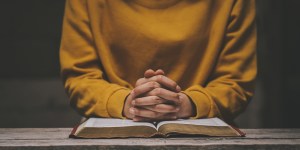This article is part of a series. Read part 1 here.
Six months after Russia launched a full-scale invasion of Ukraine, the mayor of Kyiv, Vitaliy Klitschko, said that Ukrainians needed a “word of hope more than bread.” He made the comment in a conversation with the head of the Ukrainian Greek Catholic Church, His Beatitude Sviatoslav Shevchuk.
The war’s early weeks, when people were taking shelter from Russian missiles and atrocities were being carried out against civilian populations in places like Bucha, coincided with Lent, a time when Christians are encouraged to spend more time in prayer and reading Scripture.
Now, two years later, in Lent 2024, it can be said that a war-weary world – bombarded by bad news from Gaza, Sudan, Burkina Faso, and many other hotspots – needs “a word of hope more than bread.”
In a recent interview with Aleteia, His Beatitude Sviatoslav reflected on his experience over the past two years, with his nation completely mobilized in trying to repel the Russian invader.
One thing he has come to better appreciate is the power of the word – both human and divine. He has analyzed how the misuse of words leads to war and witnessed the way people thrive when contemplating the Word of God. He has come to better appreciate his role as a bishop in bringing that Word to people.
“Living in the midst of a culture of noise – too much information hitting you every day — we have missed the feeling of the importance, the power of a word,” His Beatitude told Aleteia. “A word is not a simple vehicle of a message and information. A word is not a simple noise which helps me to communicate. A word is a power.”
The Word Became Flesh
According to the Bible, the Word is the creative power of God.
“With His Word, God created the world,” Sviatoslav said.
And God said, “Let there be light,” and there was light.
“In the beginning was the Word,” the Gospel of St. John tells us.
Human beings reflect the creative power of God through words, Sviatoslav pointed out. Words have an effect, which is why Christ warns of choosing words carefully – even refraining from using them if necessary.
“On the day of judgment people will render an account for every careless word they speak,” we read in the Gospel of Matthew.
“If I curse, the curse is an evil power which will destroy,” His Beatitude says. But a word of blessing is the “power of good which heals, which elevates the Spirit, which brings hope.”
Sviatoslav realizes that as a wartime bishop he must be a messenger, “a bearer of God’s Word. … I am witnessing the outstanding power of God’s Word, which heals, creates new situations, enlightens new perspectives, helps people to find God’s presence in their life, to increase their resilience, to inspire them.”
Wars and rumors of war continue to fill the airwaves daily. Lent is the time when Christians often come to realize that, like it or not, they are faced with spiritual battles of their own. Fasting, prayer, and making sacrifices for others all help to clarify where we stand and what’s at stake. Turning off the noise that hits us from morning to night is necessary from time to time, to help us contemplate our next move. Sitting down and reading the Word of God, such as in practicing lectio divina, can give us that extra resilience on our way to victory.
Watch the whole Aleteia interview with His Beatitude Sviatoslav here.
Next: The Sacraments




